Centuries of Racism Have Created a Mental Health Crisis Among Black Americans
Marah Lidey, cofounder and co-CEO of wellness app Shine, shares how years of racism has significantly impacted the collective mental health of Black Americans—and how her own experiences inspired her to help others.

“He wanted me to run, so he could shoot me in the back,” my father said through tears that refused to fall. It was last month, the day before Father’s Day. Instead of making plans to celebrate, my dad and I sat in grief and fear together, like so many Black parents and their children, over the senseless loss of more Black lives.
He was telling me the story of how, as a 16-year-old walking around his neighborhood in Savannah, Georgia, he had been picked up by the police. After being taken to a field and told to “run,” he instead proceeded to kneel on the ground with his hands up. That didn’t stop a police officer from beating him to the ground with his baton to “teach him a lesson,” but it did mean that my father lived through an experience that so many Black boys and men don’t.
Over the past several weeks, we’ve witnessed a national dialogue about racism against Black people in America unlike I’ve ever seen. That, coupled with hearing my Dad share his own experiences, has triggered many memories of violence I experienced at the hands of racist people and institutions in my own life. As the cofounder and co-CEO of a mental health company, Shine, I am reckoning with how those experiences have shaped my relationship with my own mental wellbeing.

Marah, pictured here at age 4, remembers feeling the impacts of racism as early as first grade.
I keep reliving my first vivid experience of racism: I was in my front yard when a tall kid from my elementary school, a boy four years older, used my face as a punching bag and repeatedly spat the N-word at me. I was in the first grade. I distinctly remember the sweat that dripping off of his face while he beat me. I cycled through three different elementary schools in Warren, Pennsylvania, where I grew up, because white children and teachers couldn’t keep their hands off me. One teacher had a bad habit of grabbing me aggressively and verbally degrading me in front of other kids. When my mom reported her to the school’s principal, the principal proceeded to tell us that I “should probably find another school,” because she didn’t think I “belonged there, anyway.”
By the time I reached middle school, the racism I experienced went from episodes of physical assault to everyday vicarious racism. My middle school boyfriend’s best friend constantly showed him videos of Black porn, asking him how it was possible to find me attractive. I spent a suspicious amount of time in the nurse's office, so I could avoid the racist boys in my gym class every Thursday. Years later, a white college classmate penned a Wikipedia-sourced essay on “ebonics” and what she described as the “irony of how Black people fought for education, and now they don’t even use it,” which our professor commented was a “great thesis.”
When I entered the workforce, the racism I experienced became more veiled. Remarks like “I asked for authentic, not ghetto” or “I felt like you were too aggressive in that meeting” or “Why do all the Black girls hang out together? I hope this isn’t an us against them thing” ring through my head when I think back on my experience in corporate America.

Marah and her father.
My experience, with all the privileges I hold as a light-skinned, able-bodied, cis-gendered, heterosexual woman, are a fraction of what many Black children and adults in America go through every single day—and that is glaringly reflected in the state of our collective mental health. For hundreds of years, this compounding systemic racism and generational trauma has wreaked havoc on Black wellbeing.
Stay In The Know
Get exclusive access to fashion and beauty trends, hot-off-the-press celebrity news, and more.
Not only are Black Americans 20 percent more likely to have serious psychological distress compared to our white counterparts, but research shows that we are also more likely to have feelings of sadness, hopelessness, and worthlessness. According to the Anxiety and Depression Association of America, depressive occurrences in Black people are more disabling, persistent, and resistant to treatment than those experienced by white people. Additionally, Black people are more likely to be victims of violent crimes, and therefore more likely to experience PTSD. Black women, specifically, are far more likely to be sexually assaulted than any other population. Let that sink in.
Black people even have our own mental health disorders. Research shows that chronic experiences of racism and microaggressions can result in "racial battle fatigue," which includes anxiety and worry, hyper-vigilance, headaches, increased heart rate and blood pressure, and other physical and psychological symptoms. This is in addition to the physiological impacts of sharing the same cells as our ancestors who were beaten, tortured, raped, and enslaved for hundreds of years.
When it comes to treatment for mental illness, Black people are at a serious disadvantage. The data shows that racial minorities who demonstrate behavioral struggles as children are more likely to be referred to the juvenile system, rather than receive the care they need. Black people aren’t supported in our mental health struggles at a young age, and when we do seek help, it’s difficult to find providers that understand us, trust us, or relate to our experience; just as with physical health care within the Black community, we see provider bias, lack of cultural competence, and socioeconomic barriers to mental health care. Lack of professional representation is part of the issue—in 2018, only 4 percent of American Psychology Association members were Black. Add all this together, and you might understand why only 30 percent of Black people with mental illness receive treatment each year, compared to the U.S. average of 43 percent.
I started Shine because I was tired of this lack of representation and inclusion in “wellness.” As I navigated the landmines of racism throughout my childhood and in corporate America, the media seemed to be telling me that all I had to do was be a little skinnier, whiter, and richer to feel better—that my mental health could be improved with a $5,000 silent retreat or by watching videos of Tony Robbins yell at his followers.
That didn’t work for me. Or my friends or family members. Or my co-founder, Naomi Hirabayashi, who is Japanese American. We were tired of hearing from corporations that pretended that mental and emotional health was the great equalizer because our experiences just weren’t the same.
At Shine, representation and inclusion are at the heart of what we do—more than 80 percent of our team are people of color, and of the nearly 1,000 meditations in our app, 90 percent are created and voiced by Black women. We don’t shy away from specificity—our content tackles issues specific to Black mental health, LGBTQ+ mental health, women’s mental health, the intersection of all of those identities, and more. The impact shows in our community, which is twice as representative of Black women as the American population.

Marah and her Shine cofounder, Naomi Hirabayashi
If we, as a society, care about Black mental health, we will take a long overdue look at both the factors that contribute to the worsening mental health within the Black community, and work to make our mental health industry more informed by those factors. I am one of the roughly three dozen Black women in America who has raised at least one million dollars in venture capital; while it’s crucial that Black founders like myself get the support, amplification, and funding needed to do our work, we are just one piece of the puzzle. Without wide-scale private and public funding of mental healthcare initiatives for Black Americans, more support for Black practitioners seeking to enter the field of mental health, and much deeper and more representative research on the why behind the disparities we see, there is no question: We will still be here in 100 years.
I am still coming to terms with the impact that racism has had on my own mental health. My daily anxiety, the grief I hold in my body every day—I know that these aren’t just the result of a “busy” “overconnected” culture. No, my mental health struggles are directly tied my father’s experience with the police that day. And to the experience of my ancestors. To my childhood bullies. To my negligent bosses. To my daily experience being a Black woman in America.
If we’ve seen anything from these past weeks, it’s that we can do more and we can do better and we can do it right now. Being Black in America is tantamount to death by a thousand cuts. If you believe that Black Lives Matter, I challenge you to also believe and fight for Black mental health.
Marah Lidey is the co-founder and co-CEO of Shine, an app and community built to create a more inclusive mental health experience for all.
Read more about racism and allyship
Related Story

Related Story

Related Story

Related Story

Related Story

Related Story

Related Story

Related Story

-
 30 Staples for Expensive-Looking Spring Outfits
30 Staples for Expensive-Looking Spring OutfitsThe ultimate wardrobe refresh
By Emma Walsh Published
-
 Rihanna Makes Her Recording Studio Comeback in a Fur Coat, Puma Sneakers, and Louis Vuitton Bag
Rihanna Makes Her Recording Studio Comeback in a Fur Coat, Puma Sneakers, and Louis Vuitton BagIs new music finally on the way?
By Kayleigh Roberts Published
-
 Kate Middleton Made a Secret, “Under the Radar” Hospital Visit to Thank Nurses and Doctors for Supporting Her During Her Cancer Battle
Kate Middleton Made a Secret, “Under the Radar” Hospital Visit to Thank Nurses and Doctors for Supporting Her During Her Cancer BattleKate made a "strictly private" visit in December o personally deliver gifts to the people involved in her treatment.
By Kayleigh Roberts Published
-
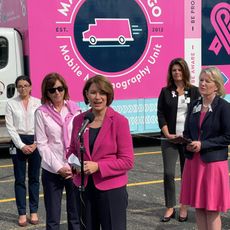 Senator Klobuchar: "Early Detection Saves Lives. It Saved Mine"
Senator Klobuchar: "Early Detection Saves Lives. It Saved Mine"Senator and breast cancer survivor Amy Klobuchar is encouraging women not to put off preventative care any longer.
By Senator Amy Klobuchar Published
-
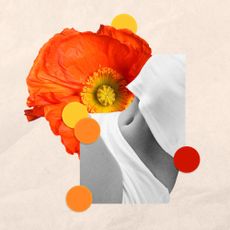 I'm an Egg Donor. Why Was It So Difficult for Me to Tell People That?
I'm an Egg Donor. Why Was It So Difficult for Me to Tell People That?Much like abortion, surrogacy, and IVF, becoming an egg donor was a reproductive choice that felt unfit for society’s standards of womanhood.
By Lauryn Chamberlain Published
-
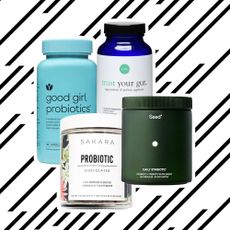 The 20 Best Probiotics to Keep Your Gut in Check
The 20 Best Probiotics to Keep Your Gut in CheckGut health = wealth.
By Julia Marzovilla Published
-
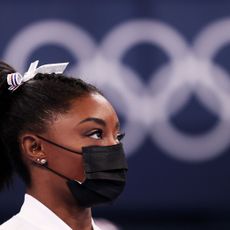 Simone Biles Is Out of the Team Final at the Tokyo Olympics
Simone Biles Is Out of the Team Final at the Tokyo OlympicsShe withdrew from the event due to a medical issue, according to USA Gymnastics.
By Rachel Epstein Published
-
 The Truth About Thigh Gaps
The Truth About Thigh GapsWe're going to need you to stop right there.
By Kenny Thapoung Published
-
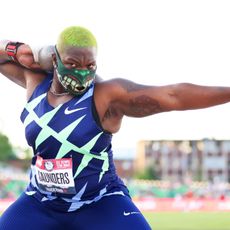 Raven Saunders Is Getting Another Shot at Life—and the Gold
Raven Saunders Is Getting Another Shot at Life—and the GoldThe Olympic shot putter almost didn't live to see the Tokyo Games. Now, she's gearing up to compete while advocating for mental health in the sports world and beyond.
By Rachel Epstein Published
-
 The High Price of Living With Chronic Pain
The High Price of Living With Chronic PainThree women open up about how their conditions impact their bodies—and their wallets.
By Alice Oglethorpe Published
-
 I Used to Imagine Murdering the Men I Dated
I Used to Imagine Murdering the Men I DatedFalling in love helped me finally figure out why.
By Jessica Amento Published